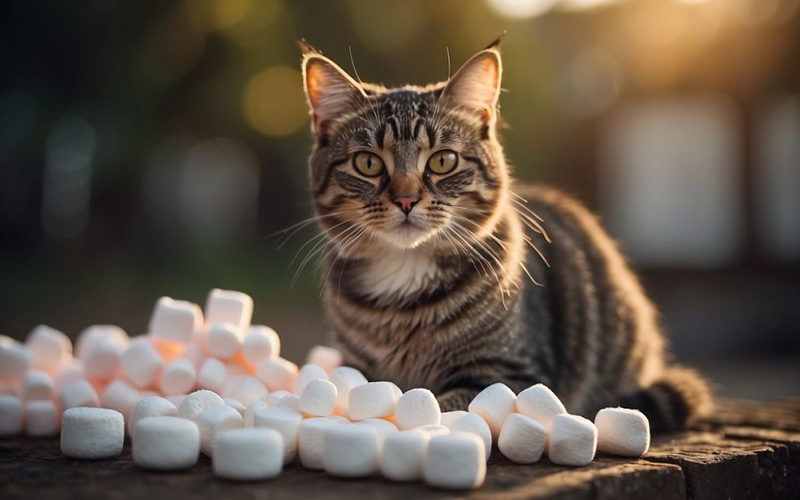Can Cats Eat Marshmallows? A Guide for Cat Owners
- 25 Feb 2025 14:11
Marshmallows are a popular sugary treat for humans, often enjoyed in hot cocoa or roasted over a campfire. But when it comes to your cat, you may be wondering, can cats eat marshmallows? The answer is: it’s not recommended. While marshmallows are not necessarily toxic to cats, they don't provide any nutritional benefits and can potentially cause some health issues if consumed.
Let’s explore why marshmallows are not ideal for cats, and the potential risks associated with feeding them this sugary snack.

Why Cats Shouldn’t Eat Marshmallows
High Sugar ContentMarshmallows are primarily made of sugar, corn syrup, and gelatin. High sugar content is one of the main reasons why marshmallows are not good for cats. While cats are obligate carnivores (meaning their bodies are designed to digest meat rather than carbohydrates), they don’t process sugar well. Feeding your cat sugary treats like marshmallows can lead to weight gain, obesity, and even diabetes over time.
No Nutritional ValueMarshmallows are essentially empty calories, offering no nutritional benefits for cats. They don’t provide the vitamins, minerals, or proteins that cats need to maintain their health. Cats require specific nutrients, such as taurine, vitamin A, and protein, which marshmallows do not provide. Feeding your cat empty-calorie treats can reduce the likelihood of them eating more nutritious foods.
Digestive IssuesCats’ digestive systems are not built to handle sugary or processed foods. While marshmallows might not cause immediate harm, they could lead to digestive upset, including diarrhea or vomiting. If your cat eats too many marshmallows or other human snacks, they might experience discomfort or other gastrointestinal issues.
Choking HazardMarshmallows are soft, but they can still pose a choking hazard for cats, especially if they are not chewed properly. Small or young cats, in particular, could accidentally swallow a piece that is too large for them to safely digest, leading to a blockage or choking incident.
Artificial IngredientsMany marshmallows contain artificial flavors, colorings, and preservatives that are not healthy for cats. These ingredients may contribute to an upset stomach or allergic reactions in sensitive cats. Some marshmallows also contain xylitol, a sweetener that is extremely toxic to pets, though it is not commonly used in regular marshmallows. Even if the marshmallows you offer don’t contain xylitol, they are still not suitable for your cat.
What to Do if Your Cat Eats Marshmallows
If your cat has accidentally eaten a small amount of marshmallow, there is generally no cause for panic. However, it’s a good idea to monitor your cat for any signs of discomfort, such as:
Vomiting
Diarrhea
Lethargy
Excessive thirst or urination
If your cat consumes a large amount of marshmallows or shows any signs of distress, it’s best to contact your veterinarian for advice on what to do next.
Healthier Treat Alternatives for Cats
If you want to treat your cat to something special, there are plenty of healthier alternatives that are better suited to their dietary needs. Here are some great treats for your cat:
Catnip: Many cats love catnip, and it can provide both entertainment and relaxation.
Small pieces of cooked chicken or turkey: These protein-rich treats are healthy and easy for your cat to digest.
Commercial cat treats: Look for treats made specifically for cats that are low in sugar and high in protein.
Cooked pumpkin: Cats often enjoy small amounts of cooked, plain pumpkin, which is gentle on their stomach and helps with digestion.
Freeze-dried fish or meat treats: These treats offer a natural source of protein that is great for your cat’s health.
Should You Use PettureX for Your Cat’s Health?
If you ever have concerns about your cat’s diet or nutrition, or if you're uncertain whether a specific treat is safe, PettureX is a great resource for pet owners. PettureX offers 24/7 online consultations, so you can get expert advice about your cat’s health and dietary needs at any time.
Conclusion: Can Cats Eat Marshmallows?
In conclusion, marshmallows are not safe or healthy for cats. They contain high amounts of sugar, have no nutritional value, and can lead to digestive upset or long-term health issues if eaten regularly. It’s best to avoid giving your cat marshmallows and instead opt for healthier, cat-friendly treats.
If your cat has eaten marshmallows or other human foods, always keep an eye out for any unusual symptoms, and contact your veterinarian if you’re concerned. Remember, there are plenty of other delicious and nutritious treats that your cat can enjoy, so stick with those to keep them happy and healthy!
For more guidance on your cat’s diet, consider using PettureX for 24/7 support and personalized advice on what’s best for your furry friend’s health.
Related

The Burning Question: Can Cats Eat Jalapenos? A Comprehensive Safety Guide
- 21 Apr 2025
Cool Temptation: Can Cats Eat Ice Cream Safely? The Vet-Backed Truth
- 21 Apr 2025
Frankly Dangerous: Can Cats Eat Hot Dogs? Vet Explains the Serious Risks
- 16 Apr 2025
A Purrfect Protein? Can Cats Eat Ground Turkey Safely? (Vet-Reviewed Guide)
- 16 Apr 2025
Gritty Situation: Can Cats Eat Grits Safely? Vet Explains the Risks
- 16 Apr 2025
Crunchy Query: Can Cats Eat Green Peppers? A Vet-Reviewed Safety Analysis
- 16 Apr 2025
Gravy Danger Zone: Can Cats Eat Gravy Safely? (Vet-Reviewed Warning)
- 16 Apr 2025
Toxic Temptation: Can Cats Eat Grapefruit? Vet Explains the Dangers
- 16 Apr 2025
Emergency Meal or Major Mistake? Can Cats Eat Dog Food For A Couple Days? (Vet Guide)
- 16 Apr 2025
Dandelions & Felines: Can Cats Eat These Common Weeds Safely? Vet Explains
- 16 Apr 2025
